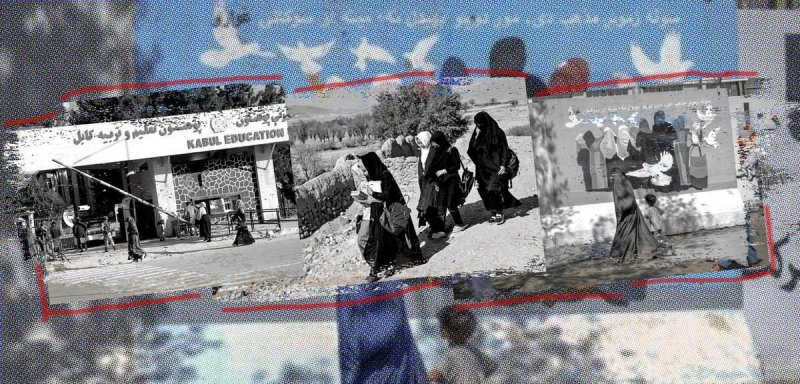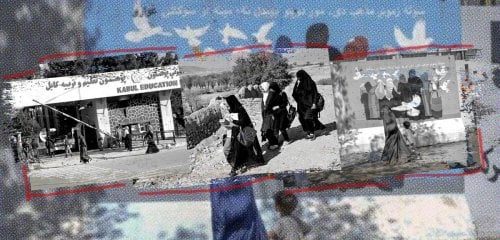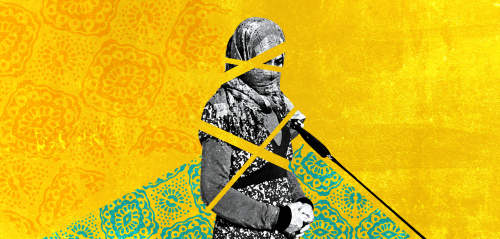“They closed the schools, and the world remained silent. They shut down our universities. Silence as well. What are we supposed to do? Kill ourselves?” These were the words of an Afghan girl in a video posted by Yalda Hakim, an Afghan journalist for BBC Persian, on her Twitter account along with the phrase, “Devastated Afghan girls mourn the loss of their education after the Taliban’s ban.”
Yalda Hakim reflects the cry of Afghan women in the face of the Western world, perhaps so that they would feel some semblance of remorse and recall their responsibility for what their policies have done to Afghanistan and its women who have become the center of suffering in this country.
There was a great sense of disappointment across the world as the Taliban seized control, seemingly keen on taking Afghanistan back to the first era of its rule at the end of the twentieth century when girls could not receive formal education. Following a long period that saw university education being allowed for women, the Minister of Higher Education in the Taliban government, Mohammad Nadim, announced on the eve of December 20th, 2022, the decision to ban university studies for girls until further notice, and said that it will be “implemented immediately”.
There was opposition to the Taliban's recent moves by some moderates in the movement, with observers asserting that the reason for announcing the ban on university education a year and a half after Taliban returned to power was internal discord within its ranks
This is not a new decision, as it is what girls in Kabul were waiting for after the group banned them from secondary education across the country on March 23.
Afghan journalist Yalda posted a video of a group of male students who rejected the decision, walking out of their exams in solidarity and to protest against their female classmates being banned from entering the university. Some women also took part in demonstrations outside the gates of universities in the capital, Kabul. “Today we took to the streets to raise our voices against the closure of the girls’ universities," said one participant in the vigil, which was quickly suppressed by the Taliban.
One university student expressed her anger by saying, "They destroyed the only bridge that could have connected us to the future.. How must I react? I believed that I could study and change my future, or bring light to my life, but they have shattered all of this.”
Another student described herself as a woman who has “lost everything”. She, who had been studying Sharia Islamic law, sees that the Taliban is going against “the rights that Islam and Allah has given us. They have to go to other Muslim countries and see that their actions are not Islamic in any way.”
International reactions
The United Nations and many countries condemned the Taliban's decision, and the UN High Commissioner for Afghanistan said that this law violates the right to equality in education and further excludes women from aspects of life in Afghan society.
For his part, the UN High Commissioner for Human Rights Volker Türk described the Taliban's decision to ban women from studying at universities as “another appalling and cruel blow to the rights of Afghan women and girls and a deeply regrettable setback for the entire country.”
As for the United States, it confirmed such a move would come with consequences for the Taliban. Secretary of State Antony Blinken said in a statement, "The Taliban cannot expect to be a legitimate member of the international community until they respect the rights of everyone in Afghanistan. No country can thrive when half of its population is held back."
Whereas for Afghanistan's western neighbor, Iran, and in light of protests taking place in the country over gaining more freedoms for women, the people there stood in solidarity with Afghan women and condemned the Taliban's decision. Iranian historical researcher Hossein Dehbashi denounced the official Iranian position, saying, “Do you remember the media hype you made when a veiled girl in France stayed behind doors waiting for hours to enter school because of her veil? Now the Taliban, dear friends to hardliners in Iran, are banning female students from universities, but the Islamic Republic remains languishing in a prison of pleasantries and fear."
Two days after the Taliban's decision, and following criticism of Iran's silence towards it, Iranian Foreign Ministry Spokesman Nasser Kanaani said on December 22, that "the Islamic Republic of Iran, as a neighbor of Afghanistan that is interested in peace, stability, and development in the country, regrets to hear the news that Afghan girls and women are facing obstacles for studying at universities.. Iran hopes that the relevant officials in Afghanistan will quickly remove the obstacles and pave the way for the resumption of education for female school and university studies at all levels of education.”
Taliban’s moderateness does not include women
The Taliban had promised a softer rule and a more moderate system of government after seizing power and following the withdrawal of US troops from the country in the summer of 2021, but the group's hardline Islamist militants have continued to strip women of their rights and freedoms.
Taliban leader Hibatullah Akhundzada and his inner circles have been against modern education in general, especially for girls and women. There has also been opposition to the Taliban's recent moves by the more moderate officials in the group, with observers asserting that the reason for the announcement of the ban on university education a year and a half after the Taliban returned to power was internal discord within the ranks of the Taliban movement.
Although the Ministry of Higher Education promised that its scholars had decided to suspend the university studies of girls until “a more suitable climate is provided”, adding that this will happen soon and that citizens should not be worried, Afghan women and the world at large still remember the movement's promises to re-open some high schools for girls but then canceling at the last minute.
Complete isolation of women
"This was the last thing the Taliban could do. Afghanistan is not a country for women, but a cage where women are locked up," said Humaira Qaderi, an Afghan university lecturer and activist in the United States, describing the situation in her country, and how the Taliban had completed their isolation of women after banning them from university education.
The ban on education is part of a series of severe restrictions imposed by the Taliban on Afghan women in recent months to keep them out of public life, in accordance with their strict and extremist interpretation of sharia. Last November, they were banned from parks, public bath houses, and gyms in the capital Kabul.
After the end of the first era of the Taliban government in 2001, UNESCO statistics indicated that the presence of women in higher education institutions had increased 20-fold between the fall of the militant group and the year 2018
Before the ban was announced, universities were operating under restrictions that discriminated against girls, as ordered by the movement after its takeover in 2021. Entrance doors were gender segregated for males and females, as were classrooms, and only female professors or old men were allowed to teach female students.
Just three months ago, the Taliban had allowed girls to take university entrance exams across the country, but there were restrictions on the subjects and majors the girls could apply for, with engineering, economics, veterinary medicine, and agriculture banned, and journalism severely restricted.
Many young women gave up education after the Taliban came to power due to the many difficulties and obstacles, amid the presence of speculation in the past months about whether the Taliban government would ban women's education. Even though the Afghan people expected this would happen sooner or later, the decision being enforced into effect came as a major shock to girls across the country.
After the end of the first era of the Taliban government in 2001, UNESCO statistics indicated that the presence of women in higher education institutions had increased 20-fold between the fall of the militant group and the year 2018.
Raseef22 is a not for profit entity. Our focus is on quality journalism. Every contribution to the NasRaseef membership goes directly towards journalism production. We stand independent, not accepting corporate sponsorships, sponsored content or political funding.
Support our mission to keep Raseef22 available to all readers by clicking here!
Interested in writing with us? Check our pitch process here!







